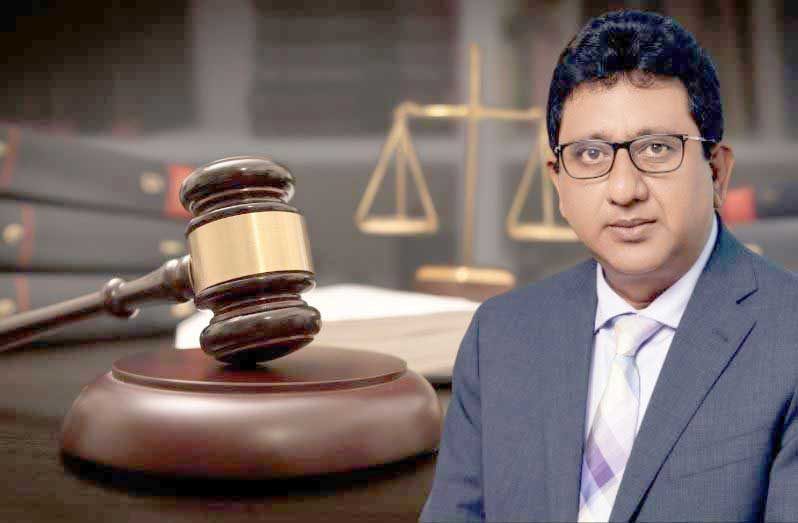–Attorney General says ‘frivolous, vexatious’ applications were clearly intended to delay elections
TWO separate cases challenging Guyana’s Proportional Representation electoral system by chartered accountant and Attorney-at-Law Christopher Ram and Vishnu Bandhu were on Tuesday dismissed by acting Chief Justice, Roxanne George.
Speaking to members of the media following the hearing, Attorney General, Anil Nandlall, S.C., disclosed that both applications were found to be frivolous, vexatious and without merit.
Nandlall stated that both cases challenged the country’s electoral system and certain sections of the Representation of the People Act (RoPA), with the applicants asking the court to set aside certain sections of the act, along with declaring unconstitutional certain aspects of the electoral framework.
Delving into the case filed by Ram, he noted that his case argued that article 160 provides for a candidate as opposed to a list of candidates to contest the election and that the RoPA is inconsistent with that article.
However, the Attorney General said Ram’s reading of the Constitution was legally flawed.
“We countered that his reading of Article 160 was completely inaccurate. Article 160 makes no provision whatsoever for an independent candidate to run. Article 160, first of all, entrenches in the constitution and establishes an electoral system called Proportional Representation,” he explained.
Nandlall added: “Proportional representation, by its very character, does not allow for independent candidates to run… Article 160 in its entirety clearly stipulates that a candidate can only run if that candidate is part of a list system.”
According to Nandlall, the courts had previously affirmed Guyana’s proportional representation system as democratic.
“We referred to many cases decided by our court system over the years where the system, the electoral system, was examined, interpreted, interrogated, inspected and found to be democratic,” he noted.
Nandlall related that they were able to persuade the Chief Justice that the case had no merit and, as such, it was dismissed with the court awarding costs against Ram in the sum of $500,000.
Meanwhile, he noted that Bandhu’s case was slightly different, with the leader of a small political party being represented by Attorney-at-Law Roysdale Forde.
He said that Bandhu, through his attorney, argued first that the structure of the country’s constitution was wrong and undemocratic.
However, he stated that they abandoned that argument and then sought to focus on Articles 147 and 160 of the constitution.
“His argument essentially was that Article 160 permits a political party to contest the elections. Article 147, he says, guarantees his client a fundamental right to participate in an election in any manner that he feels, however, provisions of ROPA restrict his client to a particular way, because ROPA says that you can only participate in the election in accordance with the provisions of ROPA,” the Attorney General noted.
He further said that, for example, Bandhu wants to contest only one seat, and ROPA mandates that he contests a minimum number of seats before he can qualify to contest elections.
With this, Bandhu argued that he has the right to belong to a political party and contest the elections, citing Article 147 as the basis. However, his argument noted that if he cannot contest the election in the manner he wants to contest, then the political rights guaranteed to him by Article 147 of the constitution are being violated.
Against this backdrop, the Attorney General noted that they clinically examined Article 147 for the court and showed that while it guarantees certain freedoms, it does not permit, in any form or fashion, the right of a person or does not confer the right of a person to participate in election.
“That’s what Mr Forde is saying, that he’s enlarging the right to form a political party and a right to belong to a political party, to include a right to contest elections in a manner that he wants to contest and that is enlarging the language of the Constitution beyond what the drafters intended,” he said.
The Attorney General added: “Now, if the drafters intended to confer that right, then the drafters would have said so. [They] would have said expressly that you have a right to participate in elections and to participate in elections, I suppose, how you wish or how you deem fit.”
Further, Bandhu also relied on the Covenant on Civil and Political Rights to bolster his case, but Nandlall argued that international treaties cannot override constitutional requirements.
“If you were able to allow international conventions to be used to amend the Constitution… then a government… can sign on to a convention and amend the Constitution without going to the Parliament… and that would be an unholy way of amending the Constitution,” he said.
The court ultimately agreed, finding that the convention could not be used to override the constitutional framework while also striking out other aspects.
The court, in the end, dismissed Bandhu’s application as well, with costs being awarded to the tune of $250,000 to the Attorney General and $250,000 to the Guyana Elections Commission (GECOM).



.jpg)








